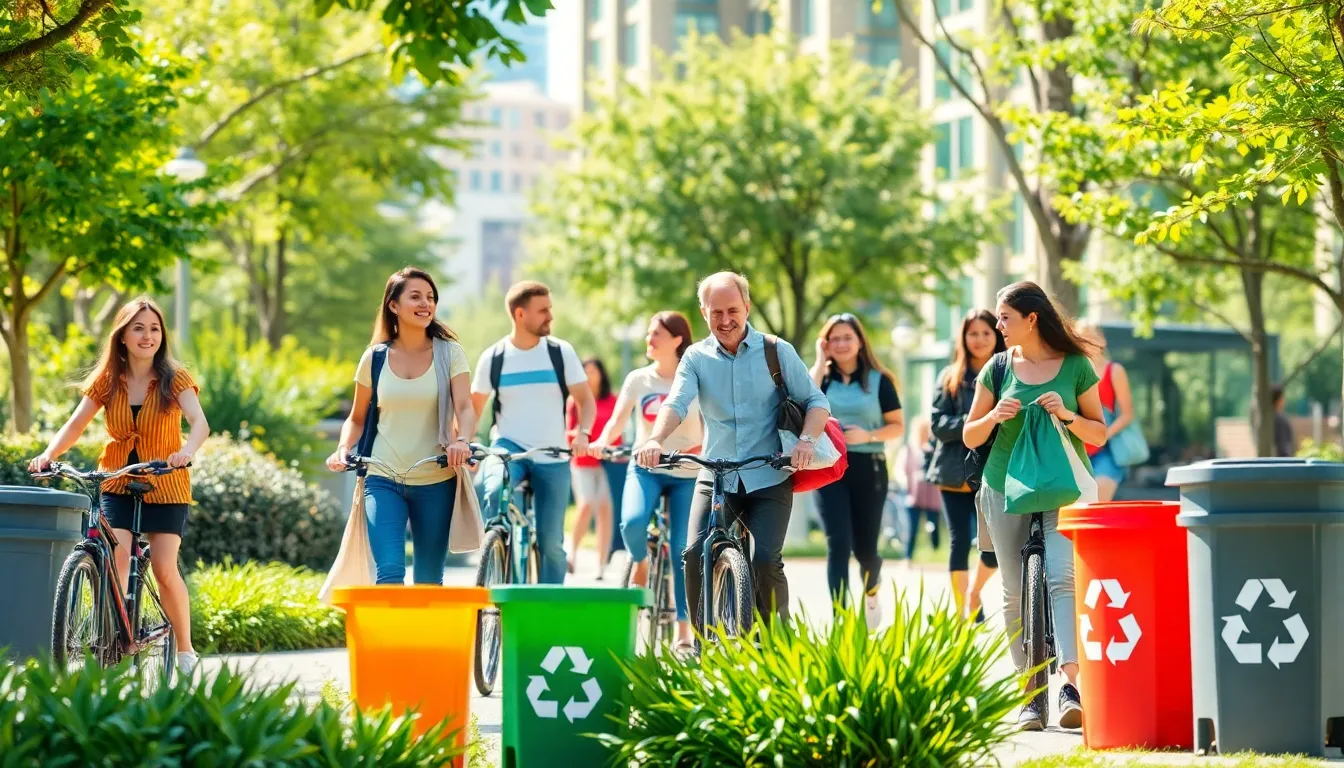In a world where plastic seems to outnumber people and climate change feels like that persistent guest who never leaves, embracing sustainability isn’t just a trend—it’s a necessity. But fear not! Going green doesn’t mean giving up your favorite comforts or living in a treehouse. With a sprinkle of creativity and a dash of humor, anyone can adopt eco-friendly habits that make Mother Earth smile.
Imagine turning your daily routines into mini eco-adventures. From swapping out that single-use coffee cup for a stylish reusable one to mastering the art of composting like a pro, these sustainability tips are not just practical; they’re downright fun! Join the movement to save the planet, one quirky habit at a time, and discover how easy it is to make a positive impact without sacrificing your lifestyle.
Table of Contents
ToggleUnderstanding Sustainability
Sustainability refers to using resources without depleting them for future generations. This practice involves balancing ecological, social, and economic factors. Core principles include reducing waste, conserving energy, and promoting biodiversity.
Integrating sustainability into daily life can happen in simple ways. People can reduce plastic use by opting for reusable bags and containers. Implementing energy-efficient appliances not only lowers energy bills but also reduces environmental impact. Choosing locally sourced food supports local economies while minimizing transportation emissions.
Education plays a crucial role in fostering sustainable habits. Schools and communities can develop programs that teach individuals about environmental stewardship. Encouraging discussions around sustainability helps cultivate a culture of awareness and responsibility.
Incorporating green practices into businesses benefits both the environment and the bottom line. Companies can implement recycling programs and adopt sustainable sourcing strategies. These approaches not only enhance brand reputation but also meet the growing demand for eco-conscious products.
Businesses are not the only ones that can make a difference. Individuals can engage in community clean-up events, plant trees, or participate in sustainable gardening. These activities encourage collective action and foster a sense of community.
Embracing sustainability requires commitment at all levels. Incremental changes lead to significant impact over time. Communities that prioritize sustainability create healthier environments, ensuring resources remain available for future generations. Sustainable choices, regardless of size, contribute to a positive legacy that protects the planet.
Everyday Sustainability Tips

Every individual can contribute to a more sustainable lifestyle through simple daily choices. Embracing eco-friendly habits transforms routines.
Reduce, Reuse, Recycle
Reducing waste begins with aware consumption. Choose products with minimal packaging to cut down on excess. Reusing items extends their life; repurpose glass jars for storage or use cloth bags instead of single-use ones. Recycling ensures that materials like paper, plastic, and metals don’t end up in landfills. Check local guidelines for recycling specifics. Educating oneself about what can be recycled reinforces sustainable practices.
Sustainable Transportation Options
Opting for public transportation lowers carbon emissions significantly. Biking and walking not only promote physical health but also reduce reliance on fossil fuels. Carpooling offers both cost savings and decreases the number of vehicles on the road. Considering electric or hybrid vehicles presents another option for eco-conscious travelers. Utilizing ride-sharing services can also minimize individual car use while supporting community-based solutions. Making informed transportation choices leads to measurable environmental benefits.
Sustainable Home Practices
Sustainable home practices can significantly minimize environmental impact. Simple adjustments enhance home efficiency and reduce resource consumption.
Energy Efficiency Improvements
Incorporating energy-efficient appliances reduces electricity usage. Switching to LED bulbs can cut lighting costs by up to 75%. Installing programmable thermostats optimizes heating and cooling, increasing comfort while using less energy. Sealing windows and doors prevents drafts, enhancing insulation and lowering energy bills. Regularly maintaining HVAC systems ensures they operate efficiently. Additionally, utilizing smart home technology allows for better energy monitoring and management. Each of these changes makes a home more sustainable.
Water Conservation Techniques
Implementing water-saving fixtures significantly lowers water usage. Low-flow showerheads and faucets can reduce water flow by 30%. Collecting rainwater for gardening purposes conserves treated water and benefits plant health. Grouping laundry loads conserves both water and energy. Regularly checking for leaks in toilets and faucets prevents water waste. Additionally, choosing drought-resistant plants for landscaping minimizes irrigation needs. Each method contributes to a more sustainable water usage strategy at home.
Sustainable Eating Habits
Sustainable eating habits play a vital role in reducing environmental impact. Making mindful food choices positively affects personal health and the planet.
Choosing Local and Seasonal Foods
Choosing local and seasonal foods minimizes transportation emissions. Foods sourced from nearby farms often require fewer resources for distribution. Fresh ingredients provide better flavor and nutritional value. Many farmers’ markets offer a variety of ripe, seasonal produce. Supporting local agriculture strengthens community economies. Opting for seasonal items reduces reliance on greenhouse-grown or imported goods.
Reducing Food Waste
Reducing food waste significantly lowers the carbon footprint associated with food production. Meal planning helps in purchasing only what’s necessary, preventing leftover spoilage. Composting food scraps enriches soil while minimizing landfill waste. Utilizing leftovers creatively transforms meals into new dishes. Engaging in portion control prevents excessive food preparation. Awareness of expiration dates encourages timely consumption, reducing unnecessary waste.
Embracing sustainability is a journey that anyone can embark on. By making small yet impactful changes in daily habits, individuals can contribute to a healthier planet. The joy of sustainable living lies in its creativity and community spirit.
Whether it’s choosing reusable items or engaging in local initiatives, every action counts. As people adopt these practices, they not only enhance their own lives but also inspire those around them.
The commitment to sustainability fosters a brighter future for generations to come. It’s about making choices that resonate with values of respect and responsibility toward the Earth. Every step taken toward sustainability is a step toward a better world.






